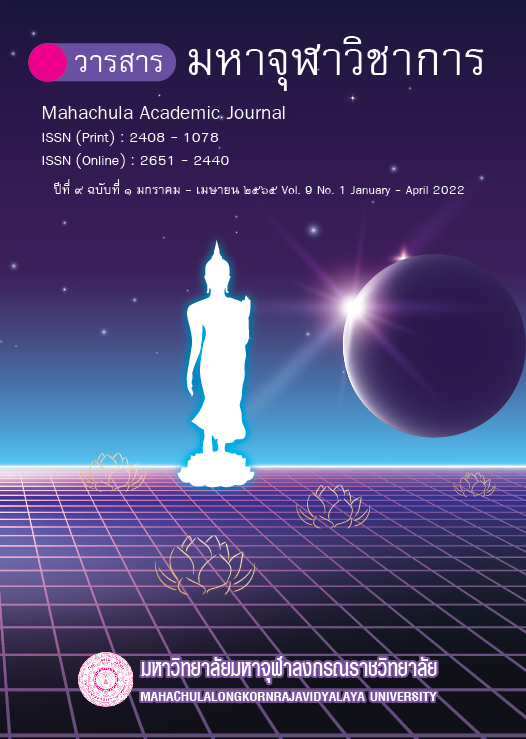Development for Student’s Morality and Ethics with Essay Writing Process of Theme on Dhamma Subject of Students at Wat Thong Noppakhun School, Phetchaburi Province
Main Article Content
Abstract
This research with the objective to (1) compare the scores of knowledge about morality and ethics of students before and after studying with the essay writing process of Theme on Dhamma Subject, 2) compare of morality and ethics behavior development scores of students before and after studying with the essay writing process of Theme on Dhamma Subject, and 3) propose guidelines for morality and ethical development of students before and after studying with the essay writing process of Theme on Dhamma Subject. This research is a combination of the quantitative research methodology, the sample group consisted of 30 students in grades 4-6 students at Wat Thong Noppakhun school, the academic year 2019. The research instruments consisted of teaching with morality and ethics development kit, knowledge scale, skill scale, and questionnaire. The data were analyzed by using percentage, mean, standard deviation, t-test. And, the qualitative research methodology was also used. The data were collected from the key informants, consisting of school director and class teacher at Thong Noppakhun school, abbot, deputy abbot, and monks who teach the Dharma of Wat Thong Noppakhun school, a total of 9 people, selected by using a purposive sampling method. The data were analyzed content analysis. The research results were as follows: (1) After studying with the essay writing process of Theme on Dhamma Subject, the students had higher knowledge. There was a statistically significant difference at the 0.01 level, (2) Before studying with the essay writing process of Theme on Dhamma Subject, the students have morality and ethics behavior development was at the moderate level, and after studying, the students had higher morality and ethical behavior development at a high level, and (3) Propose guidelines for morality and ethical development of students before and after studying with the essay writing process of Theme on Dhamma Subject is the administrators and teachers together to plan the school curriculum by integrating Buddhism principles into all subject groups, increasing the teaching time of Dhamma studies, improving teaching communication to make it more interesting, and promote activities to attend moral camps, volunteer activities, learning the principles of sufficiency economy, etc. In addition, administrators, teachers, and families should act as role models for upholding morality and ethics according to the principles of Benjasil, Benjatham is to set a good example in work, life, be kind and considerate to students by teaching, guiding what is beneficial, sinful and harmful, for the cultivate and absorb into the mind until creating students to be good people of society.
Article Details

This work is licensed under a Creative Commons Attribution-NonCommercial-NoDerivatives 4.0 International License.
References
คณะสงฆ์และรัฐบาล. หลักสูตรธรรมศึกษา ชั้นตรี ฉบับปรับปรุง พุทธศักราช ๒๕๕๗. นครปฐม : มหามงกุฎราชวิทยาลัย, ๒๕๕๘.
จำลองลักษณ์ สุจริตจันทร์. “การศึกษาพฤติกรรมด้านเบญจธรรมของนักเรียนชั้นมัธยมศึกษาปีที่ ๒ โรงเรียนชุมชนประชาธิปัตย์วิทยาคาร จังหวัดปทุมธานี”. วิทยานิพนธ์พุทธศาสตรมหาบัณฑิต. สาขาวิชาพระพุทธศาสนา : มหาวิทยาลัยมหาจุฬาลงกรณราชวิทยาลัย, ๒๕๕๔.
ณัฐ จันทร์หนูหงส์. “ศึกษาพฤติกรรมเชิงจริยธรรมของนักเรียนชั้นมัธยมศึกษาปีที่ ๑-๖ โรงเรียนสีกัน (วัฒนานันท์อุปถัมภ์) เขตดอนเมือง กรุงเทพมหานคร”. วิทยานิพนธ์พุทธศาสตรมหาบัณฑิต. สาขาวิชาพระพุทธศาสนา : มหาวิทยาลัยมหาจุฬาลงกรณราชวิทยาลัย, ๒๕๕๔.
ธนเทพพร เดชประสาท. “การประยุกต์ใช้เกมคอมพิวเตอร์ช่วยสอนในการส่งเสริมกระบวนการเขียนเรียงความแก้กระทู้ธรรมในหลักสูตรธรรมศึกษาชั้นตรี”, วิทยานิพนธ์ศิลปศาสตรมหาบัณฑิต. สาขาวิชาสนเทศศาสตร์เพื่อการศึกษา : มหาวิทยาลัยศิลปากร, ๒๕๕๘.
ธีราพร กุลนานันท์. การพัฒนาลักษณะนิสัยทางจริยธรรมสำหรับเด็กปฐมวัย : ทฤษฏี แนวคิดและ แนวปฏิบัติ. นครสวรรค์ : คอมพิวเตอร์แอนด์กราฟฟิค, ๒๕๕๒.
บัณฑิดา ศุพุทธมงคล. “การนำเบญจศีล-เบญจธรรมพัฒนานักเรียนชั้นประถมศึกษาปีที่ ๔-๖ กลุ่มโรงเรียนปากอ่าวเจ้าพระยา สำนักงานเขตพื้นที่การศึกษาประถมศึกษาสมุทรปราการ เขต ๑”. วิทยานิพนธ์พุทธศาสตรมหาบัณฑิต. สาขาวิชาการบริหารการศึกษา : มหาวิทยาลัยมหาจุฬาลงกรณราชวิทยาลัย, ๒๕๕๘.
พระครูประโชติจันทวิมล (นาม จนฺทโชโต). “การส่งเสริมคุณธรรมและจริยธรรม นักเรียนโรงเรียนนวมิน ทราชินูทิศ หอวัง นนทบุรี อำเภอปากเกร็ด จังหวัดนนทบุรี”. วิทยานิพนธ์พุทธศาสตรมหาบัณฑิต. สาขาวิชาการบริหารการศึกษา : มหาวิทยาลัยมหาจุฬาลงกรณราชวิทยาลัย, ๒๕๕๕.
พระครูปราโมทย์วรคุณ. “การสร้างชุดการสอนการเขียนเรียงความแก้กระทู้ธรรม สำหรับนักเรียนชั้นประถมศึกษาปีที่ ๕ โดยใช้วิธีสอนตามขั้นทั้ง ๔ ของอริยสัจ”. วิทยานิพนธ์ครุศาสตรมหาบัณฑิต. สาขาวิชาหลักสูตรและการสอน : มหาวิทยาลัยราชภัฏอุตรดิตถ์, ๒๕๕๓.
พระบำรุง ปญฺญาพโล (โพธิ์ศรี). “ปัจจัยที่มีผลต่อการปลูกฝังคุณธรรม และจริยธรรมของนักศึกษาวิทยาลัยเทคโนโลยีสยาม เขตบางกอกใหญ่ กรุงเทพมหานคร”. วิทยานิพนธ์การศึกษาพุทธศาสตรมหาบัณฑิต. สาขาวิชาการบริหารการศึกษา : มหาวิทยาลัยมหาจุฬาลงกรณราชวิทยาลัย, ๒๕๕๔.
พระมหาอรรถพล จอมมงคล. “การพัฒนาทักษะการตั้งกระทู้ธรรมของสามเณรด้วยบล็อกสะท้อนการเรียนรู้ตามวิธีคิดแบบวิภัชชวาท”. วิทยานิพนธ์ครุศาสตรมหาบัณฑิต. สาขาวิชาเทคโนโลยีและสื่อสารการศึกษา : จุฬาลงกรณ์มหาวิทยาลัย, ๒๕๕๖.
พระสมุห์อนันต์ อานนฺโท (ธูปจินดา). “การศึกษาพฤติกรรมด้านคุณธรรมและจริยธรรมของนักเรียนชั้นประถมศึกษาปีที่ ๖ อำเภอเมือง จังหวัดสมุทรปราการ”. วิทยานิพนธ์พุทธศาสตรมหาบัณฑิต. สาขาวิชาการบริหารการศึกษา: มหาวิทยาลัยมหาจุฬาลงกรณราชวิทยาลัย, ๒๕๕๔.
สกุณา บัณฑุรัตน์ และคณะ. แนวคิดรูปแบบและวิธีการของการพัฒนาจิตสำนึกอาสาสมัคร. กรุงเทพมหานคร : สำนักบัณฑิตอาสาสมัครมหาวิทยาลัยธรรมศาสตร์, ๒๕๕๒.
สำนักงานคณะกรรมการการศึกษาแห่งชาติ. แผนการศึกษาแห่งชาติ (พ.ศ. ๒๕๔๕-๒๕๕๙). กรุงเทพมหานคร : สำนักพิมพ์พัฒนาหลักสูตร, ม.ป.ป.
สำนักทดสอบทางการศึกษา สำนักงานคณะกรรมการการศึกษาขั้นพื้นฐาน. แนวทางการประเมินคุณภาพตามมาตรฐานการศึกษาขั้นพื้นฐาน เพื่อการประกันคุณภาพภายในของสถานศึกษา. กรุงเทพมหานคร : โรงพิมพ์สำนักงานพระพุทธศาสนาแห่งชาติ, ๒๕๕๔.
สำนักส่งเสริมกิจการการศึกษา สำนักงานปลัดกระทรวงศึกษาการ. แนวทางการจัดการเรียนรู้ธรรมศึกษา ชั้นตรี วิชาวินัย (เบญจศีล-เบญจธรรม). กรุงเทพมหานคร : โรงพิมพ์ชุมนุมสหกรณ์การเกษตรแห่งประเทศไทย จำกัด, ๒๕๕๘.
อรุณ สมานมิตร. ประวัติโรงเรียนวัดทองนพคุณ สังกัดสำนักงานเขตพื้นที่การศึกษาประถมศึกษาเพชรบุรี เขต ๑. [ออนไลน์]. แหล่งที่มา https://sites.google.com/a/petburi.go.th/ thongnoppakun, [๓ พฤศจิกายน ๒๕๖๒].


